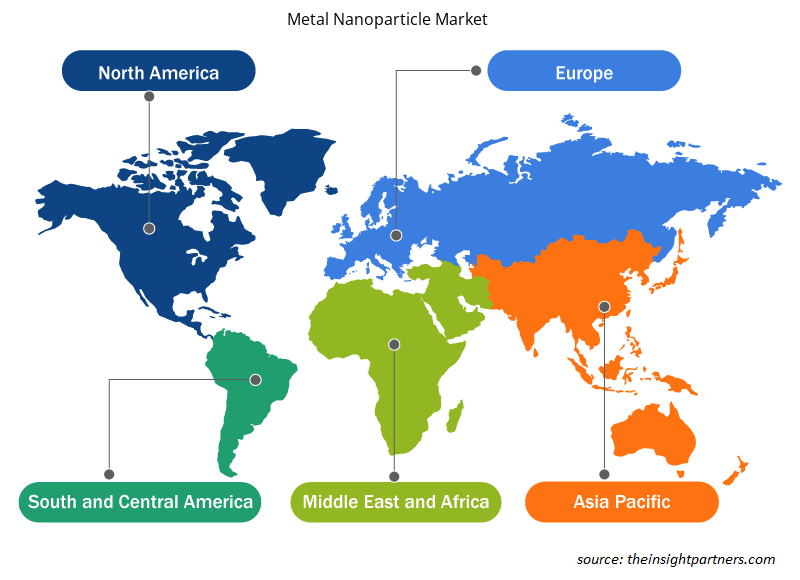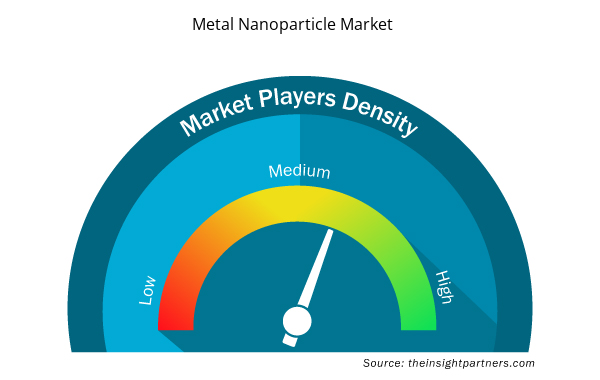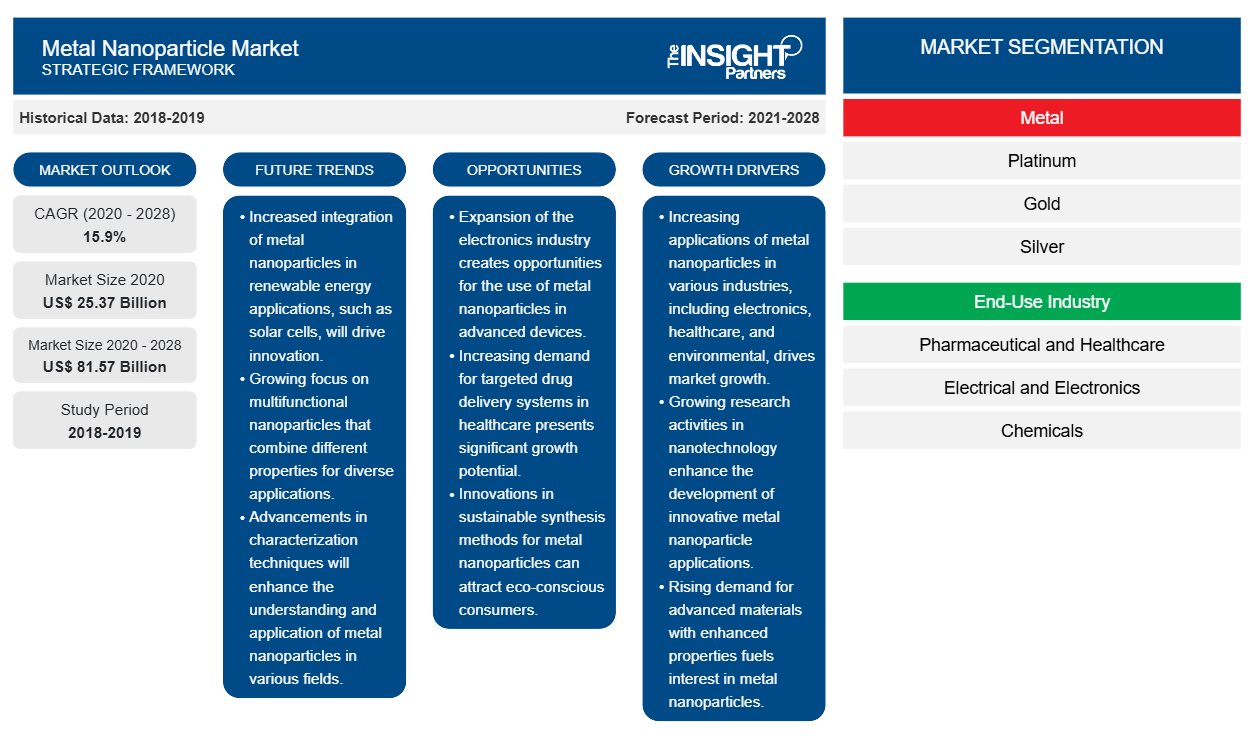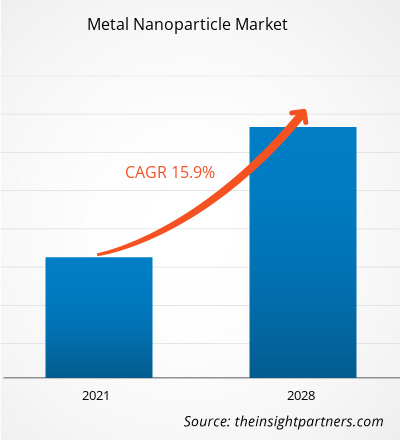[調査レポート] 金属ナノ粒子市場は2020年に253億7,392万米ドルと評価され、2028年には815億6,738万米ドルに達すると予測されており、2021年から2028年にかけて15.9%のCAGRで成長すると予想されています。
金属ナノ粒子は、高アスペクト比や均一なサイズなどの優れた特性を備えています。触媒、医療、エネルギー貯蔵など、幅広い用途で使用されています。金属ナノ粒子は、医薬品やヘルスケア、化学、化粧品、電気・電子などの最終用途産業でさまざまな用途に使用されています。
2020年には、北米が市場で最大のシェアを占めました。製薬およびヘルスケア分野の発展の増加と持続可能なエネルギー資源の需要の増加により、北米での金属ナノ粒子の需要が増加しました。米国やカナダなどの先進国の存在と、R&D活動に対する政府の支援のおかげで、この地域の国々は革新的な製品を探求し、生産しています。さらに、医療技術の進歩とヘルスケア分野への投資の増加により、医療業界での金属ナノ粒子の需要が促進されています。これに伴い、この地域の国内外の金属ナノ粒子企業の存在は、この地域の金属ナノ粒子市場に有利な機会を生み出しました。
進行中のCOVID-19パンデミックは、金属ナノ粒子市場に大きな影響を与えています。この流行により、国内外の国境が突然閉鎖されたため、業務効率が歪められ、バリューチェーンが混乱し、収益の損失と損害が発生しました。生産とサプライチェーンの混乱は、金属ナノ粒子市場に悪影響を及ぼしました。さまざまな国でロックダウンが実施され、渡航制限が課されたため、世界的な製品供給が減少し、物流業務も縮小しました。数分で結果が出るCOVID-19検査キットに金ナノ粒子を利用する研究が進められています。米国では、メリーランド大学の研究者グループが、COVID-19を引き起こす新型コロナウイルスを10分以内に検出でき、結果が肉眼で確認できる診断検査を開発したと主張しました。この検査は、SARS-COV-2ウイルスのヌクレオカプシドリン酸化タンパク質の核酸配列で覆われた金ナノ粒子を使用する、シンプルな比色法ベースのアッセイです。これに伴い、Sugentech, Inc.(韓国企業)は、COVID-19のIgMおよびIgG抗体を判定する金ナノ粒子ベースの免疫クロマトグラフィー検査キットであるSGTi-flex COVID-19 IgM/IgG検査キットを開発しました。この検査は、感染に反応して生成される特定のタンパク質である抗体の判定に役立ちます。したがって、ヘルスケア分野での金ナノ粒子の使用増加は、金属ナノ粒子市場にプラスの影響を与えています。
要件に合わせてレポートをカスタマイズする
このレポートの一部、国レベルの分析、Excelデータパックなど、あらゆるレポートを無料でカスタマイズできます。また、スタートアップや大学向けのお得なオファーや割引もご利用いただけます。
- このレポートの主要な市場動向を入手してください。この無料サンプルには、市場動向から見積もりや予測に至るまでのデータ分析が含まれます。
市場分析
医療産業における金属ナノ粒子の応用
医療業界では、金属ナノ粒子は、治療薬、薬物送達、バイオイメージング、癌の診断および治療などの用途でますます使用されています。銀、チタン、金、白金、銅など、さまざまな種類の金属ナノ粒子は、潜在的な治療効果があることで知られています。金と銀のナノ粒子は、グラム陰性菌とグラム陽性菌の増殖を効果的に抑制します。金ナノ粒子は、感染症、癌、心臓病の診断におけるバイオマーカーの検出に使用されます。白金ナノ粒子は、その固有の抗菌、抗酸化、抗癌特性により、インプラント、イメージング、光熱療法、薬物送達などの生物医学用途で使用されています。チタンナノ粒子は、さまざまな表面に存在する細菌を殺すために使用されています。紫外線にさらされると、これらのナノ粒子は強力な酸化効果を生み出し、光触媒消毒剤として機能します。銀ナノ粒子には抗菌性と抗癌性があり、創傷コーティングやデバイスコーティングの製造でますます使用されています。銅ナノ粒子は、医療分野で感染症の予防、制御、治療に使用されています。そのため、医療業界でさまざまな金属ナノ粒子の応用が急増し、金属ナノ粒子市場が成長しています。
金属の洞察
金属に基づいて、金属ナノ粒子市場は、プラチナ、金、銀、鉄、チタン、その他に分類されます。 2020年には、その他セグメントが市場を支配しました。 その他の金属ナノ粒子は、亜鉛、銅、シリカ、マンガン、アルミニウム、ニッケル、セリウム、タリウムなどの金属でできています。 亜鉛ナノ粒子は無機金属酸化物であり、医薬品、包装の防腐剤、抗菌剤として安全に使用できます。 亜鉛ナノ粒子は食品材料に容易に拡散し、微生物を殺します。 銅ナノ粒子は、自然のプロセスまたは化学合成によって生成されます。 着色剤や抗菌剤としてますます使用されています。 シリカナノ粒子は、主に電気および熱絶縁体、および薬物送達アプリケーションで使用されます。マンガン ナノ粒子 (ナノドットまたはナノパウダー) は、球形または面状の高表面積の金属ナノ構造粒子です。アルミニウム ナノ粒子は水素貯蔵容量が大きく、航空機、軍事用途、自動車、ロケット推進剤に広く使用されています。
金属ナノ粒子市場で活動している主要な市場プレーヤーには、American Elements、BBI Group、EPRUI Biotech Co. Ltd.、Meliorum Technologies, Inc.、Nanocomposix、Nanosc, Inc.、Nanostructured and Amorphous Materials, Inc.、Nanoshel LLC.、TANAKA HOLDINGS Co., Ltd.、およびUS Research Nanomaterials INC. などがあります。市場の主要プレーヤーは、合併や買収、製品の発売などの戦略を採用して、地理的プレゼンスと消費者ベースを拡大しています。
レポートの注目点
- 金属ナノ粒子業界の進歩的なトレンドは、プレーヤーが効果的な長期戦略を策定するのに役立ちます
- 先進国市場と発展途上国市場での成長を確保するために企業が採用する事業成長戦略
- 2019年から2028年までの世界の金属ナノ粒子市場の定量分析
- さまざまな業界における金属ナノ粒子の需要の推定
- ポーター分析は、業界で活動するバイヤーとサプライヤーが市場の成長を予測する有効性を示す
- 競争市場シナリオと金属ナノ粒子の需要を理解するための最近の動向
- 金属ナノ粒子市場の成長を牽引・抑制する要因と相まって、市場の動向と見通し
- 世界の金属ナノ粒子市場の成長に関する商業的関心を支える戦略についての理解は、意思決定プロセスに役立ちます。
- 市場のさまざまなノードにおける金属ナノ粒子の市場規模
- 世界の金属ナノ粒子市場の詳細な概要とセグメンテーション、およびその業界の動向
- 有望な成長機会があるさまざまな地域の金属ナノ粒子市場規模
金属ナノ粒子
金属ナノ粒子市場の地域別分析
予測期間を通じて金属ナノ粒子市場に影響を与える地域的な傾向と要因は、Insight Partners のアナリストによって徹底的に説明されています。このセクションでは、北米、ヨーロッパ、アジア太平洋、中東、アフリカ、南米、中米にわたる金属ナノ粒子市場のセグメントと地理についても説明します。

- 金属ナノ粒子市場の地域別データを入手
金属ナノ粒子市場レポートの範囲
| レポート属性 | 詳細 |
|---|---|
| 2020年の市場規模 | 253.7億米ドル |
| 2028年までの市場規模 | 815.7億米ドル |
| 世界のCAGR(2020年 - 2028年) | 15.9% |
| 履歴データ | 2018-2019 |
| 予測期間 | 2021-2028 |
| 対象セグメント | 金属による
|
| 対象地域と国 | 北米
|
| 市場リーダーと主要企業プロフィール |
|
金属ナノ粒子市場のプレーヤーの密度:ビジネスダイナミクスへの影響を理解する
金属ナノ粒子市場は、消費者の嗜好の変化、技術の進歩、製品の利点に対する認識の高まりなどの要因により、エンドユーザーの需要が高まり、急速に成長しています。需要が高まるにつれて、企業は提供を拡大し、消費者のニーズを満たすために革新し、新たなトレンドを活用し、市場の成長をさらに促進しています。
市場プレーヤー密度とは、特定の市場または業界内で活動している企業または会社の分布を指します。これは、特定の市場スペースに、その規模または総市場価値と比較して、どれだけの競合相手 (市場プレーヤー) が存在するかを示します。
金属ナノ粒子市場で事業を展開している主要企業は次のとおりです。
- アメリカの要素
- BBIグループ
- エプルイバイオテック株式会社
- メリオラムテクノロジーズ株式会社
- ナノコンポジックス
免責事項:上記の企業は、特定の順序でランク付けされていません。

- 金属ナノ粒子市場のトップキープレーヤーの概要を入手
金属ナノ粒子市場(金属別)
- 白金
- 金
- 銀
- 鉄
- チタン
- その他
金属ナノ粒子市場、用途別
- 医薬品およびヘルスケア
- 電気・電子
- 化学薬品
- パーソナルケアと化粧品
- その他
企業プロフィール
- アメリカの要素
- BBIグループ
- エプルイバイオテック株式会社
- メリオラムテクノロジーズ株式会社
- ナノコンポジックス
- ナノスク株式会社
- ナノストラクチャード アンド アモルファス マテリアルズ社
- ナノシェルLLC
- TANAKAホールディングス株式会社
- USリサーチナノマテリアルズINC
- 過去2年間の分析、基準年、CAGRによる予測(7年間)
- PEST分析とSWOT分析
- 市場規模価値/数量 - 世界、地域、国
- 業界と競争環境
- Excel データセット



Report Coverage
Revenue forecast, Company Analysis, Industry landscape, Growth factors, and Trends

Segment Covered
This text is related
to segments covered.

Regional Scope
North America, Europe, Asia Pacific, Middle East & Africa, South & Central America

Country Scope
This text is related
to country scope.
よくある質問
In 2020, the others segment dominated the market. The other metal nanoparticles are made of metals such as zinc, copper, silica, manganese, aluminum, nickel, cerium, and thallium. Zinc nanoparticle is an inorganic metal oxide and can be safely used in medicines, as a preservative in packaging and an antimicrobial agent. Zinc nanoparticles easily diffuse into the food material as well as kills the microbe.
In 2020, the electricals and electronics segment dominated the market. Gold nanoparticles are being used as a conductor in applications ranging from printable inks to electronic chips. They are increasingly used to connect conductors, resistors, and various other elements of an electronic chip.
In 2020, pharmaceutical and healthcare dominated the metal nanoparticle market. In the medical industry, metal nanoparticles are increasingly being used in therapeutic agents, drug delivery, bioimaging, and cancer diagnostics as well as treatment, among other applications. Various types of metal nanoparticles, including silver, titanium, gold, platinum, and copper, are known for their potential therapeutic effects.
In 2020, Asia Pacific, emerged as the fastest growing regional market. The growing healthcare industry in Asia Pacific is leading to an increased demand for metal nanoparticles. The gold nanoparticles are used in the pharmaceutical sector to produce different medicated drugs, along with various engineered technologies that use nanoparticles for the targeted delivery and release of therapeutic agents.
The major players operating in the global metal nanoparticle market are American Elements; BBI Group; EPRUI Biotech Co. Ltd.; Meliorum Technologies, Inc.; Nanocomposix; Nanosc, Inc.; Nanostructured and Amorphous Materials, Inc.; Nanoshel LLC.; TANAKA HOLDINGS Co., Ltd.; and US Research Nanomaterials INC among many others.
In 2020, North America accounted for the largest share in the market. The increase in the development of the pharmaceutical and the healthcare sectors and a rise in demand for sustainable energy resources have increased the demand for metal nanoparticles in North America. Owing to the presence of developed countries, such as the US and Canada, and conducive government support for R&D activities, countries in the region explore and produce innovative products.
Trends and growth analysis reports related to Chemicals and Materials : READ MORE..
The List of Companies - Metal Nanoparticles Market
- American Elements
- BBI Group
- EPRUI Biotech Co. Ltd.
- Meliorum Technologies, Inc.
- Nanocomposix
- Nanosc, Inc.
- Nanostructured and Amorphous Materials, Inc.
- Nanoshel LLC.
- TANAKA HOLDINGS Co., Ltd.
- US Research Nanomaterials INC
The Insight Partners performs research in 4 major stages: Data Collection & Secondary Research, Primary Research, Data Analysis and Data Triangulation & Final Review.
- Data Collection and Secondary Research:
As a market research and consulting firm operating from a decade, we have published and advised several client across the globe. First step for any study will start with an assessment of currently available data and insights from existing reports. Further, historical and current market information is collected from Investor Presentations, Annual Reports, SEC Filings, etc., and other information related to company’s performance and market positioning are gathered from Paid Databases (Factiva, Hoovers, and Reuters) and various other publications available in public domain.
Several associations trade associates, technical forums, institutes, societies and organization are accessed to gain technical as well as market related insights through their publications such as research papers, blogs and press releases related to the studies are referred to get cues about the market. Further, white papers, journals, magazines, and other news articles published in last 3 years are scrutinized and analyzed to understand the current market trends.
- Primary Research:
The primarily interview analysis comprise of data obtained from industry participants interview and answers to survey questions gathered by in-house primary team.
For primary research, interviews are conducted with industry experts/CEOs/Marketing Managers/VPs/Subject Matter Experts from both demand and supply side to get a 360-degree view of the market. The primary team conducts several interviews based on the complexity of the markets to understand the various market trends and dynamics which makes research more credible and precise.
A typical research interview fulfils the following functions:
- Provides first-hand information on the market size, market trends, growth trends, competitive landscape, and outlook
- Validates and strengthens in-house secondary research findings
- Develops the analysis team’s expertise and market understanding
Primary research involves email interactions and telephone interviews for each market, category, segment, and sub-segment across geographies. The participants who typically take part in such a process include, but are not limited to:
- Industry participants: VPs, business development managers, market intelligence managers and national sales managers
- Outside experts: Valuation experts, research analysts and key opinion leaders specializing in the electronics and semiconductor industry.
Below is the breakup of our primary respondents by company, designation, and region:

Once we receive the confirmation from primary research sources or primary respondents, we finalize the base year market estimation and forecast the data as per the macroeconomic and microeconomic factors assessed during data collection.
- Data Analysis:
Once data is validated through both secondary as well as primary respondents, we finalize the market estimations by hypothesis formulation and factor analysis at regional and country level.
- Macro-Economic Factor Analysis:
We analyse macroeconomic indicators such the gross domestic product (GDP), increase in the demand for goods and services across industries, technological advancement, regional economic growth, governmental policies, the influence of COVID-19, PEST analysis, and other aspects. This analysis aids in setting benchmarks for various nations/regions and approximating market splits. Additionally, the general trend of the aforementioned components aid in determining the market's development possibilities.
- Country Level Data:
Various factors that are especially aligned to the country are taken into account to determine the market size for a certain area and country, including the presence of vendors, such as headquarters and offices, the country's GDP, demand patterns, and industry growth. To comprehend the market dynamics for the nation, a number of growth variables, inhibitors, application areas, and current market trends are researched. The aforementioned elements aid in determining the country's overall market's growth potential.
- Company Profile:
The “Table of Contents” is formulated by listing and analyzing more than 25 - 30 companies operating in the market ecosystem across geographies. However, we profile only 10 companies as a standard practice in our syndicate reports. These 10 companies comprise leading, emerging, and regional players. Nonetheless, our analysis is not restricted to the 10 listed companies, we also analyze other companies present in the market to develop a holistic view and understand the prevailing trends. The “Company Profiles” section in the report covers key facts, business description, products & services, financial information, SWOT analysis, and key developments. The financial information presented is extracted from the annual reports and official documents of the publicly listed companies. Upon collecting the information for the sections of respective companies, we verify them via various primary sources and then compile the data in respective company profiles. The company level information helps us in deriving the base number as well as in forecasting the market size.
- Developing Base Number:
Aggregation of sales statistics (2020-2022) and macro-economic factor, and other secondary and primary research insights are utilized to arrive at base number and related market shares for 2022. The data gaps are identified in this step and relevant market data is analyzed, collected from paid primary interviews or databases. On finalizing the base year market size, forecasts are developed on the basis of macro-economic, industry and market growth factors and company level analysis.
- Data Triangulation and Final Review:
The market findings and base year market size calculations are validated from supply as well as demand side. Demand side validations are based on macro-economic factor analysis and benchmarks for respective regions and countries. In case of supply side validations, revenues of major companies are estimated (in case not available) based on industry benchmark, approximate number of employees, product portfolio, and primary interviews revenues are gathered. Further revenue from target product/service segment is assessed to avoid overshooting of market statistics. In case of heavy deviations between supply and demand side values, all thes steps are repeated to achieve synchronization.
We follow an iterative model, wherein we share our research findings with Subject Matter Experts (SME’s) and Key Opinion Leaders (KOLs) until consensus view of the market is not formulated – this model negates any drastic deviation in the opinions of experts. Only validated and universally acceptable research findings are quoted in our reports.
We have important check points that we use to validate our research findings – which we call – data triangulation, where we validate the information, we generate from secondary sources with primary interviews and then we re-validate with our internal data bases and Subject matter experts. This comprehensive model enables us to deliver high quality, reliable data in shortest possible time.


 このレポートの無料サンプルを入手する
このレポートの無料サンプルを入手する